I am trying to get IP address on local machine:
private string GetIP()
{
string strHostName = "";
strHostName = System.Net.Dns.GetHostName();
IPHostEntry ipEntry = System.Net.Dns.GetHostEntry(strHostName);
IPAddress[] addr = ipEntry.AddressList;
foreach (IPAddress ipaddr in addr)
{
if (ipaddr.AddressFamily == System.Net.Sockets.AddressFamily.InterNetwork)
return ipaddr.ToString();
}
return "IP error";
}
However I can't find a way to identify which interface is the one i need. For example:

I am lucky that the one i need is second in the list. But if it were in the back i would get IP of a wrong interface. How to check if I am getting IP for local area connection (or in general, the interface responsible for the connection).